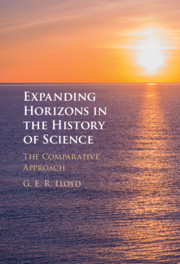
-
Select format
-
- Publisher:
- Cambridge University Press
- Publication date:
- August 2021
- August 2021
- ISBN:
- 9781009029285
- 9781316516249
- Creative Commons:
-
This content is Open Access and distributed under the terms of the Creative Commons Attribution licence CC-BY-NC 4.0.
https://creativecommons.org/creativelicenses - Dimensions:
- (229 x 152 mm)
- Weight & Pages:
- 0.38kg, 162 Pages
- Dimensions:
- Weight & Pages:
Open AccessYou have access to this book
Book description
This book challenges the common assumption that the predominant focus of the history of science should be the achievements of Western scientists since the so-called Scientific Revolution. The conceptual frameworks within which the members of earlier societies and of modern indigenous groups worked admittedly pose severe problems for our understanding. But rather than dismiss them on the grounds that they are incommensurable with our own and to that extent unintelligible, we should see them as offering opportunities for us to revise many of our own preconceptions. We should accept that the realities to be accounted for are multi-dimensional and that all such accounts are to some extent value-laden. In the process insights from current anthropology and the study of ancient Greece and China especially are brought to bear to suggest how the remit of the history of science can be expanded to achieve a cross-cultural perspective on the problems.
Reviews
‘This text is aimed at academic historians of science interested in the intercultural complexities of the field, demonstrating how investigating approaches and results from studies of nature in past cultural contexts (using the tools of contemporary disciplines) can enrich current and future research in the history of science … Recommended.’
J. W. Dauben Source: Choice
Contents
Full book PDF-
Expanding Horizons in the History of Science
pp i-ii -
-
- You have access
- Open access
- HTML
- Export citation
-
-
Expanding Horizons in the History of Science - Title page
pp iii-iii - The Comparative Approach
-
-
- You have access
- Open access
- HTML
- Export citation
-
-
Copyright page
pp iv-iv -
-
- You have access
- Open access
- HTML
- Export citation
-
-
Contents
pp v-v -
-
- You have access
- Open access
- HTML
- Export citation
-
-
Figures
pp vi-vi -
-
- You have access
- Open access
- HTML
- Export citation
-
-
Additional material
pp vii-viii -
-
- You have access
- Open access
- HTML
- Export citation
-
-
Introduction
pp 1-7 -
-
- You have access
- Open access
- HTML
- Export citation
-
-
Chapter 1 - On Aspects of the Status Quaestionis
pp 8-22 -
-
- You have access
- Open access
- HTML
- Export citation
-
-
Chapter 2 - Translatability, Intelligibility, Revisability
pp 23-31 -
-
- You have access
- Open access
- HTML
- Export citation
-
-
Chapter 3 - Demystifying the Greek Miracle
pp 32-43 -
-
- You have access
- Open access
- HTML
- Export citation
-
-
Chapter 4 - The Question of Causal Factors
pp 44-56 -
-
- You have access
- Open access
- HTML
- Export citation
-
-
Chapter 5 - The Criteria of Theories, Simplicity for Instance
pp 57-70 -
-
- You have access
- Open access
- HTML
- Export citation
-
-
Chapter 5a - Supplementary Note on Greek Astronomical Models
pp 71-74 -
-
- You have access
- Open access
- HTML
- Export citation
-
-
Chapter 6 - Definitions and the Problems of Foreclosure
pp 75-85 -
-
- You have access
- Open access
- HTML
- Export citation
-
-
Chapter 7 - The Challenge of ‘Mythology’
pp 86-94 -
-
- You have access
- Open access
- HTML
- Export citation
-
-
Chapter 8 - Elements, Processes, Substances, Stuff
pp 95-105 -
-
- You have access
- Open access
- HTML
- Export citation
-
-
Chapter 9 - Health and Disease, Illness and Well-Being
pp 106-114 -
-
- You have access
- Open access
- HTML
- Export citation
-
-
Chapter 10 - Mind, Body, Heart, Brain, Soul, Spirit
pp 115-128 -
-
- You have access
- Open access
- HTML
- Export citation
-
-
Conclusions
pp 129-134 -
-
- You have access
- Open access
- HTML
- Export citation
-
-
Bibliography
pp 135-147 -
-
- You have access
- Open access
- HTML
- Export citation
-
-
Index
pp 148-156 -
-
- You have access
- Open access
- HTML
- Export citation
-
Metrics
Altmetric attention score
Full text views
Full text views help Loading metrics...
Loading metrics...
* Views captured on Cambridge Core between #date#. This data will be updated every 24 hours.
Usage data cannot currently be displayed.
Accessibility standard: Unknown
Why this information is here
This section outlines the accessibility features of this content - including support for screen readers, full keyboard navigation and high-contrast display options. This may not be relevant for you.
Accessibility Information
Accessibility compliance for the PDF of this book is currently unknown and may be updated in the future.


